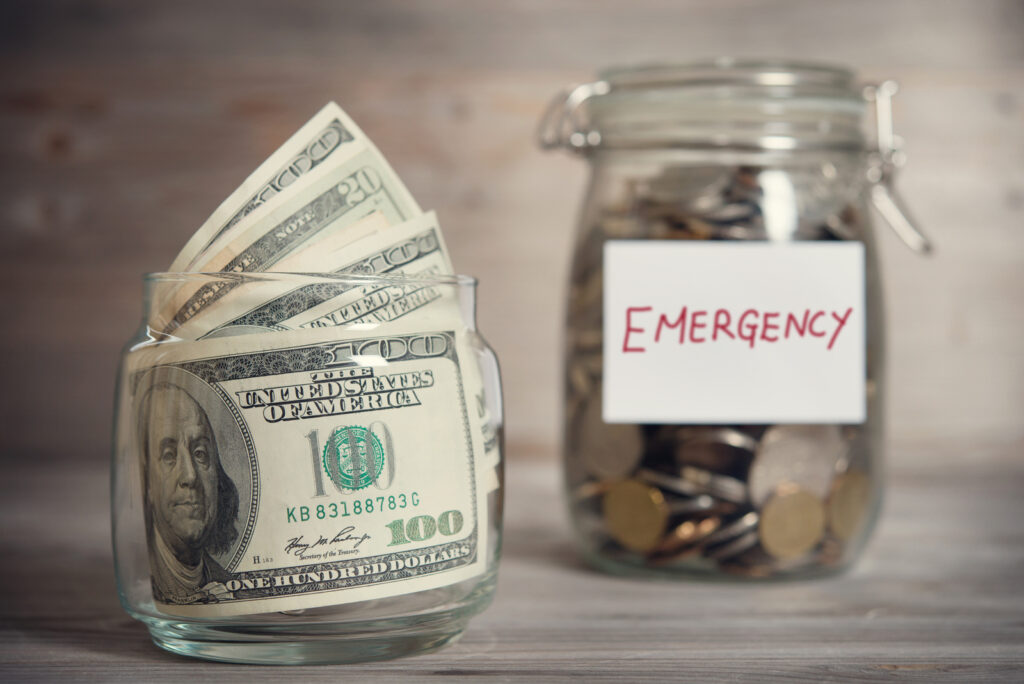An emergency fund is a savings fund that ideally can cover 3-6 months of your living expenses. For those who want to be even more careful, you can aim to build an emergency fund that’s about 12 months’ worth of income.

However, you don’t want to go beyond this because the interest rates in most savings accounts do not keep up with inflation rates. So your money is actually losing value.
That said, when it comes to liquidity, nothing quite beats cash in the bank. Even if you have money stashed away in a certificate of deposit (CD), you may be charged a penalty/fee if you wish to withdraw your money early. So, having a savings account is best for an emergency fund.
Do note: avoid saving your money in a checking account. The interest rates on these accounts are even more paltry.
An emergency fund is a savings fund that ideally can cover 3-6 months of your living expenses. For those who want to be even more careful, you can aim to build an emergency fund that’s about 12 months’ worth of income.

- How to save consistently
The biggest obstacle that most people have when it comes to saving is that they just don’t have enough money left over. Once the bills are paid, they barely have enough to even last them until the next paycheck.
So how do you save when you only have enough to get by?
Here’s the problem in a nutshell – don’t have high expectations in the beginning. The finance books will tell you to put aside 10% of your income and to ‘pay yourself first’.
The hard truth is that sometimes even 10% is too much when you’re struggling to make ends meet. If your income is $2,000, 10% of it will be $200. Many people can’t save this much. They need it for their bills.
So what do they do?
They don’t save. They just spend it all and rue their circumstances. Yet, if you asked them whether they could save $25 to $50, most would be able to do it.
Well, go ahead and save $50 then. It’s not the amount that matters. It’s the HABIT which counts. You must develop the habit of saving. 4 months of saving $50 each month would leave $200 in the bank.
The same $200 they’re struggling to save now. Sure it took 4 months, but guess what?
If they didn’t save, they’d have nothing after 4 months too.
- Effective savings strategies
For starters, you must create a budget for yourself and follow it. Set aside money for the needs, bills, etc.
You may wish to delay expenses on items that are merely ‘wants’ until you’ve set aside about 3 months’ worth of income. It’ll be tough and will require discipline, but delayed gratification here will ensure that you save up an emergency fund fast.
You’ll also want to go through your expenses with a fine-toothed comb and eliminate all unnecessary expenses such as magazine subscriptions you don’t use, branded items, cable channels you don’t watch and so on.
Trimming your expenses is one of the easiest ways to find more money to save.
Another way to save more is to EARN more. You may wish to take on a side job like driving Uber on your days off or starting a business online, etc.
The more you earn, the more you can save. While this might be a bit of a drag, you won’t need to do it forever. Once you have saved enough in your emergency fund, you can stop working yourself to the bone.
In fact, just 3 months of a side income might allow you to save up enough to make up at least half of your emergency fund. The rest you can top up with your monthly savings.
- Slashing bills
If you’re in debt, use the ‘debt avalanche’ method to pay off your outstanding bills. Start off by paying the debt with the highest interest rate first. Focus on it while paying the minimum on the rest of the debt.
Once the highest interest debt is paid off, you can use the money you normally paid towards it and pay off the next highest interest debt over and above the minimum you were paying.
When you do this, you’ll be reducing the amount you’re paying for interest. As your debt diminishes, you’ll have much more money to save in your emergency fund.
- In conclusion…
Building an emergency fund is not rocket science. Spend less and save more. Over and above that, you can also earn more and save more.
It’ll take time. Getting started is ALWAYS the hardest part, but once you gain momentum and see the amount in your savings account increasing, you’ll be motivated to save more.
That’s really all there is to it. Once you have about 6 months of income saved up, leave it in your savings account and do NOT touch it.
Many people dig into their savings and deplete it all over time. Avoid using your emergency fund for anything else but an emergency.
Once your emergency fund is done, you can open another savings account and start saving up until you have enough to deposit into a certificate of deposit, which has a higher interest rate.
From then on, it’s just a matter of making your money grow with wise investment vehicles and aim to retire in comfort. But it all starts with you having an emergency fund.
